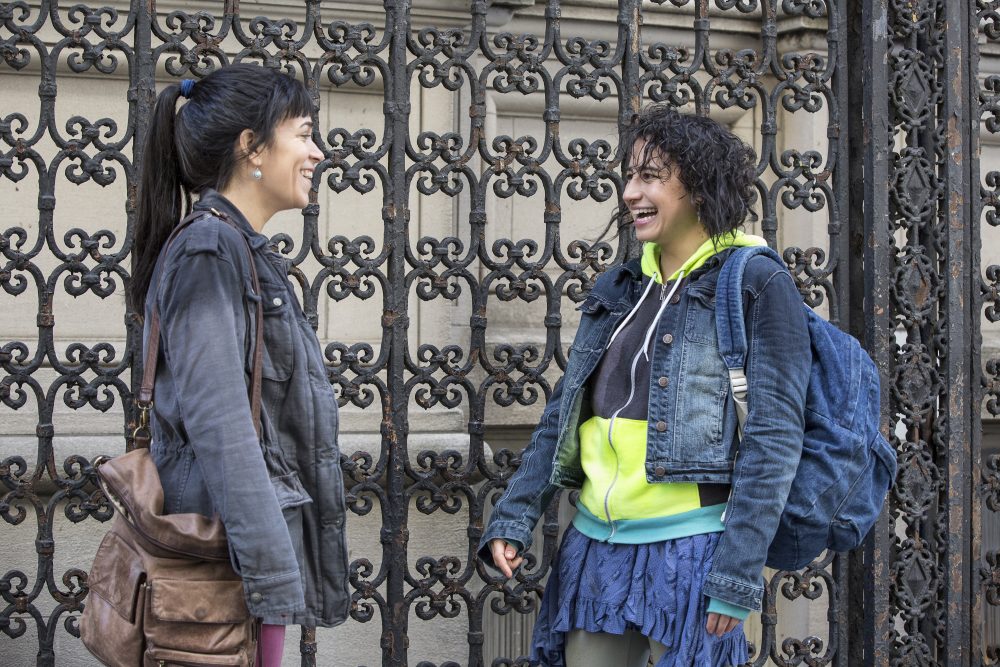Advertisement
Review
In An Ambitious Fourth Season 'Broad City,' Inevitably, Takes On Trump

The fourth season of “Broad City” begins with an episode called “Sliding Doors.” As the title suggests, it’s a riff on the 1998 film of the same name. Like the movie that inspired it, the episode hinges on the moment when a train is missed, or alternatively, caught, opening up two parallel universes — an absurd conceit that “Broad City” plumbs ruthlessly for laughs. But instead of Gwyneth Paltrow and John Hannah meeting cute and falling in love (or almost, but not quite, meeting in the first place), it’s Abbi Jacobson and Ilana Glazer, who play ragamuffin besties in "Broad City."
“Sliding Doors” continues the show’s run of stellar season openers. For one, it’s a neat subversion of the rom-com formula, where “boy meets girl” is refashioned into the great romance between two best girlfriends. This is a concept that other series have explored fruitfully, namely “Sex and the City” and “Girls,” and "Broad City" is frequently grouped among them. It is often said that New York City is a character in these shows, but “Broad City" has always treated New York more like an obstacle course. (The critical factor that determines whether Abbi and Ilana make the train is a suitcase-toting Wall Street bro who pukes in their path.) In the “Broad City” universe, the main source of conflict is not friendship or romance, but the city itself, the show’s hapless heroines bonded together on their odyssey through it.
“Sliding Doors” takes place in 2011, on the day that Abbi and Ilana first meet. (The episode mines a lot of comedy from its giddy observation that trends from six years ago, like Four Loko, already seem dated.) Their dynamic asserts itself immediately: Ilana Wexler, played by Glazer, is a raunchy slacker with a questionable white-girl affinity for hip-hop culture, and Abbi Abrams, played by Jacobson, is a rule-following neurotic who is helplessly drawn to the other’s flagrant disregard for social propriety. Ilana is funny because she is a girl who is ruder and more disgusting than any boy, something the show has always touted as a kind of feminist triumph. In one timeline, a guy selling bubble guns on the street makes a lewd remark as the women pass by. Abbi sputters, but Ilana eviscerates him with brutal precision. “That’s your symbol of masculinity — a bubble gun?” she sneers, before tossing one of the toys on the ground as she strolls away. “Good luck living the rest of your life.”

Like the best episodes of “Broad City,” “Sliding Doors” buffets its characters mercilessly through seemingly random events that suddenly and delightfully converge. This is not always the case in the two other episodes that Comedy Central has made available to critics ahead of the show’s Sept. 13 season premiere. A few of the plot lines feel rote; you can see them accelerating toward their foregone conclusions. The show also struggles, with limited success, to show growth in its characters while trying not to upend the eternal state of arrested development that makes them funny.
In episode six, “Witches,” “Broad City” at last confronts the thing that has been hanging over it since the season began: the election of Donald Trump. Jacobson and Glazer, who are also the show’s creators, have stated in interviews that they ended up rewriting most of the fourth season after Trump won the presidency despite near-unanimous forecasts of a Clinton victory. ("Broad City" effectively endorsed Clinton during the primaries when it featured her in a cameo appearance in Season 3.)
While most television series tend not to engage directly with the events of the day, preferring to make more oblique commentary, this was never really an option for “Broad City.” The show has always been proudly progressive and overtly feminist, depicting New York City’s teeming diversity as something to be both celebrated and unpacked. Trump’s election was, in a sense, a rebuttal of the show’s entire ethos. It would seem, too, that “Broad City” is uniquely equipped to take on a Trump presidency, attuned as it always has been to the preoccupations of white urban liberals and possessed of a puerile streak that allows it to “go low” in order to meet the free world’s foul-mouthed leader on his level.
Advertisement

And so it comes as no surprise (spoiler alert) that the trauma of Trump’s ascension produces a sexual problem for Ilana. Specifically, she discovers that she has been unable to orgasm since the election. “Orgasms have been down 100 percent since Trump was elected,” a sex therapist named Betty solemnly informs her. “It’s been horrible for everyone.”
The plot is meant as a gesture of defiance, a middle finger to the regressive powers that now occupy the White House. And on one level it works, by correctly locating the Trump phenomenon in toxic white masculinity and concocting an answer that looks to female power. (“You’re traumatized by the fact that a sexual assault-bragging steak salesman has become our president," Betty says. "You need to find a way to rise above it in spite of him.”) It also captures the free-floating rage and anxiety that has seized the left since Trump’s rise.
Yet the story fell flat for me. “Witches” ends up exposing one of the most frustrating things about the anxious and impotent left. In the process of making a grand symbolic statement, the episode unwittingly centers the personal trauma of privileged liberals over real political solutions, and avoids doing any soul-searching for what got us here in the first place. Yes, the personal is political, but what good is claiming your power if you don’t get involved?
At the same time, I can’t entirely blame “Broad City” for this problem. Many comedians have pointed out that it’s hard to make fun of Trump because he’s just so over the top — how do you lampoon something that’s already a parody of itself? The chilling flipside, of course, is that the subject is at the same time too heavy. In less than a year in office, Trump has made significant headway in his mission to erase Obama’s tenuous legacy; in the process, he has emboldened his white supremacist followers, put immigrants at grave risk and played nuclear brinksmanship with North Korea. Laughing at him can sometimes feel hollow.

Still, I have faith that “Broad City” may yet find some way to effectively defy Trump. Watching “Witches,” I kept flashing back to an episode from season two called “Citizen Ship.” In it, Abbi, Ilana, Ilana’s on-and-off-again boyfriend Lincoln (played by an effortlessly hilarious Hannibal Buress) and Jaimé, Ilana’s cherubic Guatemalan roommate (depicted with dimply charm by Arturo Castro), plan to celebrate Jaimé's newly minted American citizenship by crashing a private harbor cruise. “It’s unbelievable that we live in a city where our ancestors passed through Ellis Island,” Ilana gushes on the way to the boat. Lincoln, who is black, looks pained. “Uh, mine didn’t.”
The moment is awkward and unexpectedly funny, and it doesn’t dampen the mood; later, the characters gaze in awe as the Statue of Liberty glides into view. That’s “Broad City” at its best: politically trenchant yet somehow good-natured, able to produce laughs by laying bare the great gulfs that still separate Americans from one another. In the face of increasingly vulgar politics, the show's greatest defiance may be its unyielding belief that irreverence can be deployed in support of the values — equality, inclusiveness, generosity — that so many of us still hold dear.
This article was originally published on September 12, 2017.

